
Thursday, October 30, 2008 | Ben Lando
ANKARA, Turkey | As the U.S. and Iraqi governments struggle to finalize an agreement on continuing the U.S. troop presence in Iraq, there are few more interested bystanders than Turkey.

Ankara is worried that a hasty U.S. pullout will create a power vacuum that would provoke new fighting between Iraqi Sunni and Shi'ite Muslims, embolden the Kurdish population that spans Iraq across Turkey's southeastern border and create a turf war between Iran and Saudi Arabia for influence in Baghdad.
"Turkey is critical for a stable Iraq," said Morton Abramowitz, U.S. ambassador to Turkey from 1989 to 1991 and a senior fellow at the Century Foundation. "Turkey is very focused on keeping Iraq together, is with us on everything we do on that score, and would hate to see U.S. forces leave."
In a recent session for U.S. reporters, bloggers and think-tank analysts, Turkish President Abdullah Gul said Turkey agrees with the United States on most aspects of foreign policy.
"I don't believe there are similar nations where such parallels could be drawn," Mr. Gul said. Washington benefits from Turkish-brokered talks between Israel and Syria, Turkish efforts to reduce tensions between Afghanistan and Pakistan and its ties with both Russia and Iran, Mr. Gul said.
Relations have improved markedly since 2003, when the Turkish Parliament rejected U.S. requests to use bases here as a staging ground for the U.S. invasion of Iraq.
Until last year, Turkey also thought Washington wasn't doing enough to combat the Kurdistan Workers' Party (PKK), an Iraq-based group responsible for numerous attacks within Turkey.
"The PKK has once again become a very big issue in Turkey because of the incidents and sizable number of casualties," Mr. Abramowitz said.
The group is labeled a terrorist organization by Turkey, the United States and Europe, but has been able to maintain camps in northern Iraq's mountains and launch attacks into Turkey.
U.S.-Turkish relations on this issue have improved since President Bush authorized intelligence sharing with Turkey's military.
"When I talked to President Bush in our meetings, I asked him, 'How would you feel if there were terrorist camps that were allowed to exist on the Mexican side of your border with Mexico? How would you feel if these camps were allowed to exist there and then the terrorists in those camps were allowed to stage attacks inside United States territory?'" Mr. Gul said.
He mentioned an Oct. 3 ambush that killed 17 Turkish soldiers.
"Something that I should stress is our people are angry," Mr. Gul said, "and they are angry because PKK terrorists, just because they're ethnically Kurdish, are given camps and the opportunity to be harbored in northern Iraq."
Turkey sent special envoy Murat Ozcelik to Baghdad recently to discuss the PKK issue with Iraqi leaders. He also met with Massoud Barzani, president of the Kurdistan Regional Government (KRG) in Iraq - a major overture for a country that fears taking actions that could legitimize a semi-autonomous region.
Turkey is "ready to cooperate with the government of Iraq, the U.S. and, depending on circumstances, the local government," a senior Foreign Ministry official said. The "local government" is the KRG.
By sending an envoy to Baghdad, Mr. Abramowitz said, Turkey is being practical, building relations for a time when the United States isn't there.


